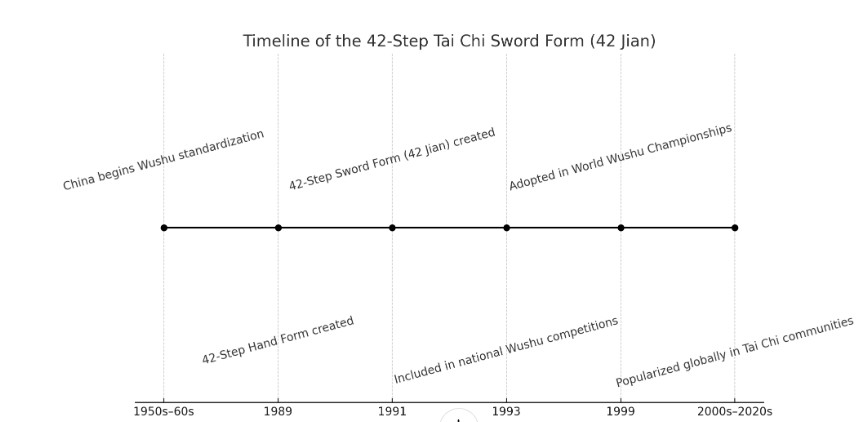The 42 Sword Tai Chi Form (also known as Tai Chi 42 Sword or 42-Step Taiji Jian) is a standardized Wushu-style Tai Chi sword routine developed in China to combine the essence of major traditional Tai Chi styles with sword techniques. It was created in the 1990s as part of the competition-style Tai Chi forms, similar to the 42 Form Hand.
🔹 Key Facts:
-
Name: 42 Tai Chi Sword Form (太极剑42式 / Taiji Jian 42 Shi)
-
Created by: Chinese Wushu authorities in the early 1990s
-
Purpose: Standardized for competition and demonstration
-
Length: 42 movements
-
Styles Incorporated: Yang, Chen, Wu, and Sun
-
Weapon: Jian (straight double-edged sword)
🕰️ Historical Background of the 42 Sword Form

📍 Context: Standardization for Competition
In the 1980s–90s, the Chinese Wushu Association (CWA) began creating standardized routines to:
-
Promote Chinese martial arts in international competitions
-
Provide common forms for judging and demonstration
-
Preserve essential elements of traditional Tai Chi while adapting to modern sport aesthetics
This led to:
-
The 42-Step Hand Form (1989)
-
The 42-Step Sword Form (1991)
These became official competition forms for national and international events like:
-
The Asian Games
-
The World Wushu Championships
-
The National Games of China
Please refer to the following link for official instruction manual for the 42 sword form -> link
⚔️ Creation of the 42 Sword Form
👤 Developed by:
The form was choreographed by a panel of top Wushu experts under the guidance of:
-
Li Deyin (李德印) – a prominent Tai Chi master and educator
-
Experts in Yang, Chen, Wu, and Sun styles
-
The goal was to integrate essential sword techniques from these lineages into a unified routine
🎯 Key Design Features:
-
42 named movements
-
Draws from the Yang style’s grace, Chen style’s power, Sun style’s agility, and Wu style’s compactness
-
Includes traditional sword actions like:
-
Liao (upward swing)
-
Ci (thrust)
-
Pi (chop)
-
Dian (pointing)
-
-
Combines slow, meditative sequences with faster, more explosive expressions, showcasing both internal and external aspects
🔹 Characteristics:
-
Emphasizes smooth, flowing movements and internal power.
-
Combines Tai Chi principles (softness, rooting, intention, yin-yang) with sword techniques (cutting, slicing, thrusting, pointing).
-
Contains both slow and fast segments, with balanced stances, spiral energy, and coordinated breathing.
🔹 Benefits of Practicing 42 Sword:
-
Enhances balance, focus, and dexterity
-
Improves coordination between hand and weapon
-
Builds internal energy (Qi) and calmness
-
Strengthens the upper body and wrist control
-
Deepens understanding of Tai Chi martial applications
🥋 42 Tai Chi Sword Form – Movement List
(太极剑42式 – Tàijí Jiàn 42 Shì)
-
起势 – Beginning Form
-
指裆剑 – Pointing to the Crotch
-
虚步撩剑 – Empty Stance Upward Swing
-
白蛇吐信 – White Snake Spits Out Its Tongue
-
左右挂剑 – Left and Right Hanging Sword
-
斜飞势 – Diagonal Flying
-
迎风掸尘 – Dusting in the Wind
-
风卷荷叶 – Wind Sweeps Lotus Leaf
-
青龙出水 – Green Dragon Emerges from Water
-
凤凰展翅 – Phoenix Spreads Wings
-
左右弯弓 – Left and Right Drawing the Bow
-
马步平托剑 – Level Support in Horse Stance
-
猛虎跳涧 – Fierce Tiger Leaps Over Ravine
-
海底捞月 – Scooping the Moon from the Sea Bottom
-
鱼跃龙门 – Fish Leaps Over Dragon Gate
-
穿梭剑 – Piercing Sword
-
狮子摇头 – Lion Shakes Its Head
-
独立反刺 – Single Leg Reverse Thrust
-
凌波微步 – Light Steps on Water
-
转身反撩 – Turn and Upward Swing
-
挂剑分身 – Hanging Sword and Split Body
-
展翅点头 – Spread Wings and Nod
-
回身卷地 – Turning and Sweeping the Ground
-
退步搭刀 – Retreat and Carry Sword
-
掩手肱剑 – Covering Arm and Thrusting Sword
-
撩剑回身 – Lift Sword and Turn Body
-
穿云剑 – Piercing the Clouds Sword
-
燕子抄水 – Swallow Skims the Water
-
狮子摇铃 – Lion Shakes the Bell
-
推窗望月 – Push Window to View the Moon
-
翻身点头 – Turn and Nod
-
转身斜飞 – Turn and Diagonal Flying
-
幻影双分 – Phantom Double Split
-
青龙回头 – Green Dragon Turns Its Head
-
白虹贯日 – White Rainbow Pierces the Sun
-
落花飞剑 – Falling Flower, Flying Sword
-
上步平托 – Step Forward, Level Support
-
灵猫捕鼠 – Agile Cat Catches the Mouse
-
翻身撩剑 – Turn and Lift Sword
-
转身劈剑 – Turn and Chop Sword
-
掩手肱剑 – Cover Arm and Thrust Sword
-
收势 – Closing Form